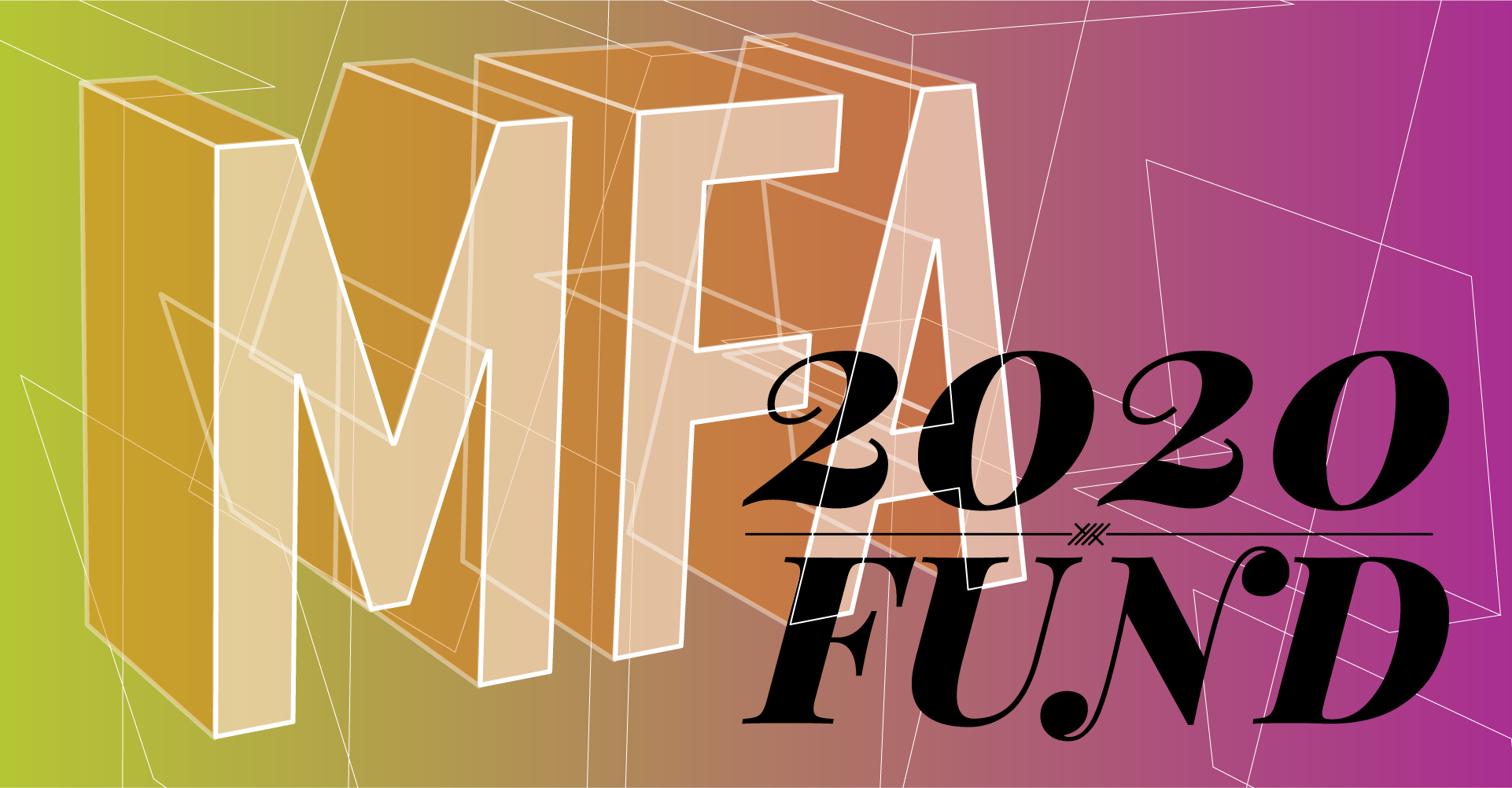Coursework
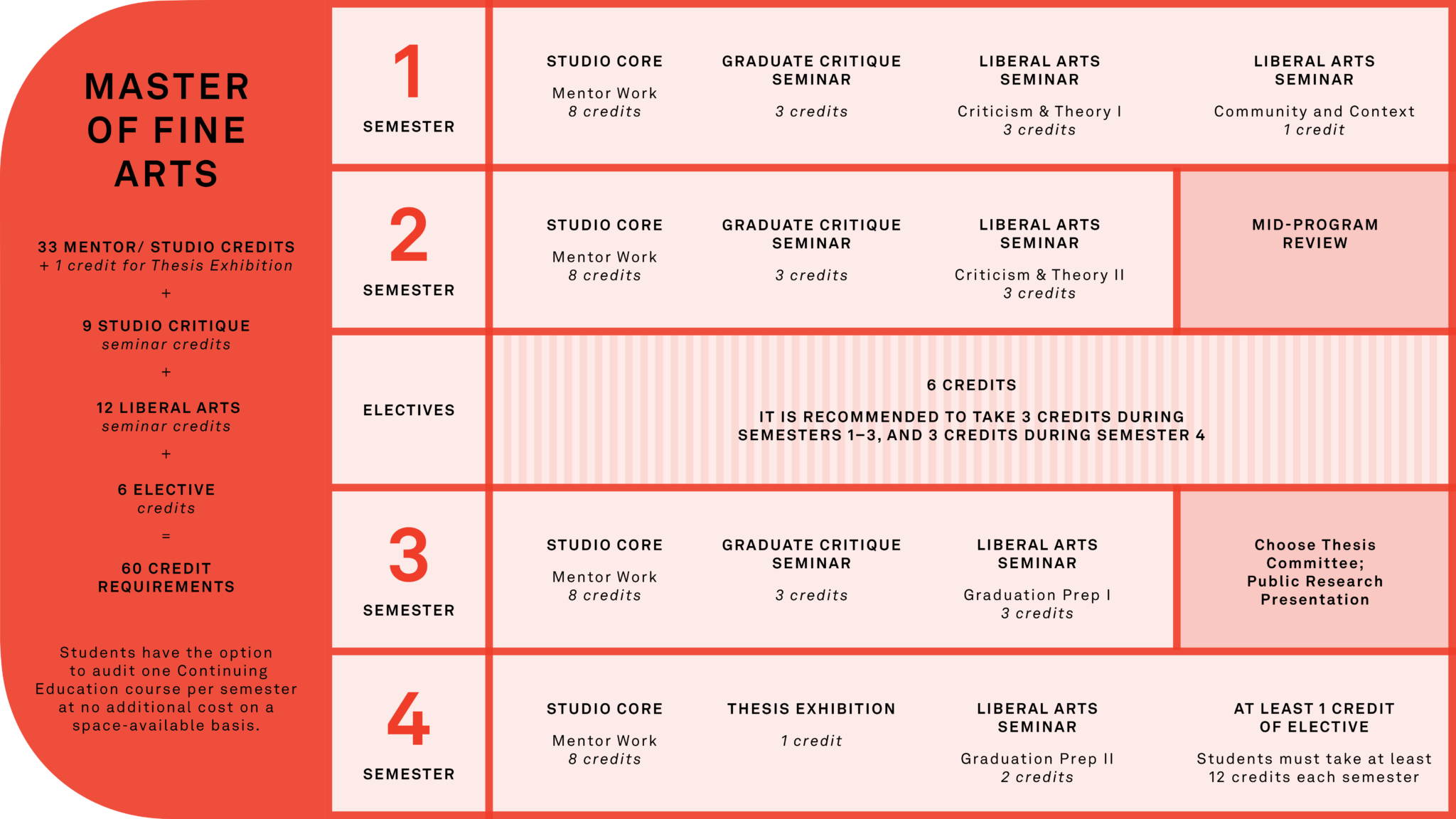
MENTORSHIP
GRST GM99 Mentored Credits, 8 credits per semester (32 total)
Mentorship is regarded as the core of the MCAD graduate curriculum. Students can expect to spend approximately one hour per week with their mentor (or equivalent). Each semester the student and mentor determine its content, which is summarized in a Learning Contract in context with the student Long-Range Learning Plan. Students work one-on-one with their mentor in the advancement of studio work, studio research, and professional practice. Mentor Credits coursework is structured to facilitate discussions and assess goals on a weekly basis. Credits may also include attending visiting artist/designer lectures, exhibitions and workshops, audited courses, seminars, and internship and externship opportunities.
See our list of recent mentors.
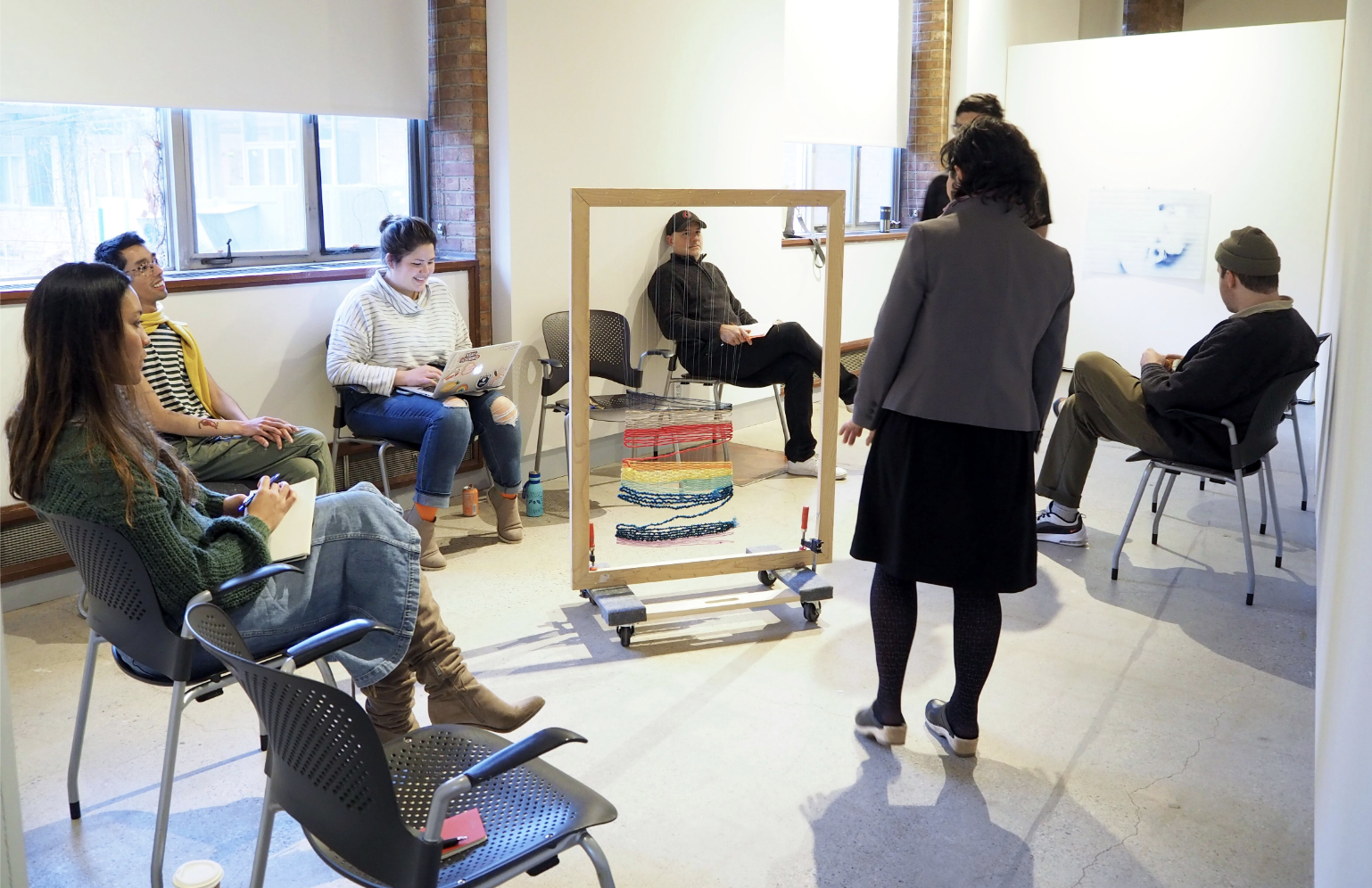
Alonzo Pantoja ’20 in Graduate Critique Seminar
SEMESTER 1
GRLA 7005 Community and Context, 1 credit
This five-week course will occur at the start of the first semester in the MFA Program. Students will take field trips focused on different groups of people living in the Twin Cities who have influenced and shaped our current cultural and social circumstances. These could include Indigenous, Black, immigrant, and hyper-local/neighborhood-level perspectives. Artists, designers, curators, writers, or other cultural workers/thinkers can be invited to help illuminate relationships to creative practice. Students will be prompted to reflect on personal and situational context, privilege and difference, intentions versus results, and intended audience for their creative practices. The course will establish a framework for sustained commitment to antiracism in practice and community life by introducing related vocabulary and concepts.
GRST 7002 Graduate Critique Seminar 1, 3 credits
The Graduate Critique Seminar provides all graduate students structured group critiques of their work and that of their peers. Students develop a methodology of critique and the ability to discuss work across disciplines. A rotation of guest artists, designers, and critics visit throughout the semester. The visitors present their own work and discuss their practice and then participate in student critiques. Each student has a minimum of two formal critiques each semester with options for additional critiques throughout the semester as time permits. The seminar includes contemporary readings and conversations about contemporary art, successful critiquing strategies, and methods for describing intent, content, meaning, and form of presented artwork.
GRLA7011 Criticism & Theory I, 3 credits
This is one of two courses that exposes students to contemporary visual criticism and theory in art and design. This course brings together reading, discussion, writing, oral presentations, and at least three site-visits (museums, galleries, agencies, conventions, studios, etc.), to help students expand their art and design vocabulary. Students will practice verbally analyzing and articulating their practices in relationship to various histories and cultures. Via individual studio visits with the instructor early in the semester, this course becomes highly tailored to reflect the areas of foci of the enrolled students. Early in this course, students will examine concepts of privilege and difference in relationship to systems of power, both in and outside the art and design worlds. Also early in the course, students will be briefly introduced basic popular lenses for examining art and design work, including selected identity issues (race, gender, sexuality), iconography/semiotics, Marxism, and cultural studies/post-colonialism. Topics for the remainder of the course will be determined by the students’ practices, and the instructor will provide appropriate historical context as necessary.
Read more about our recent MFA faculty.
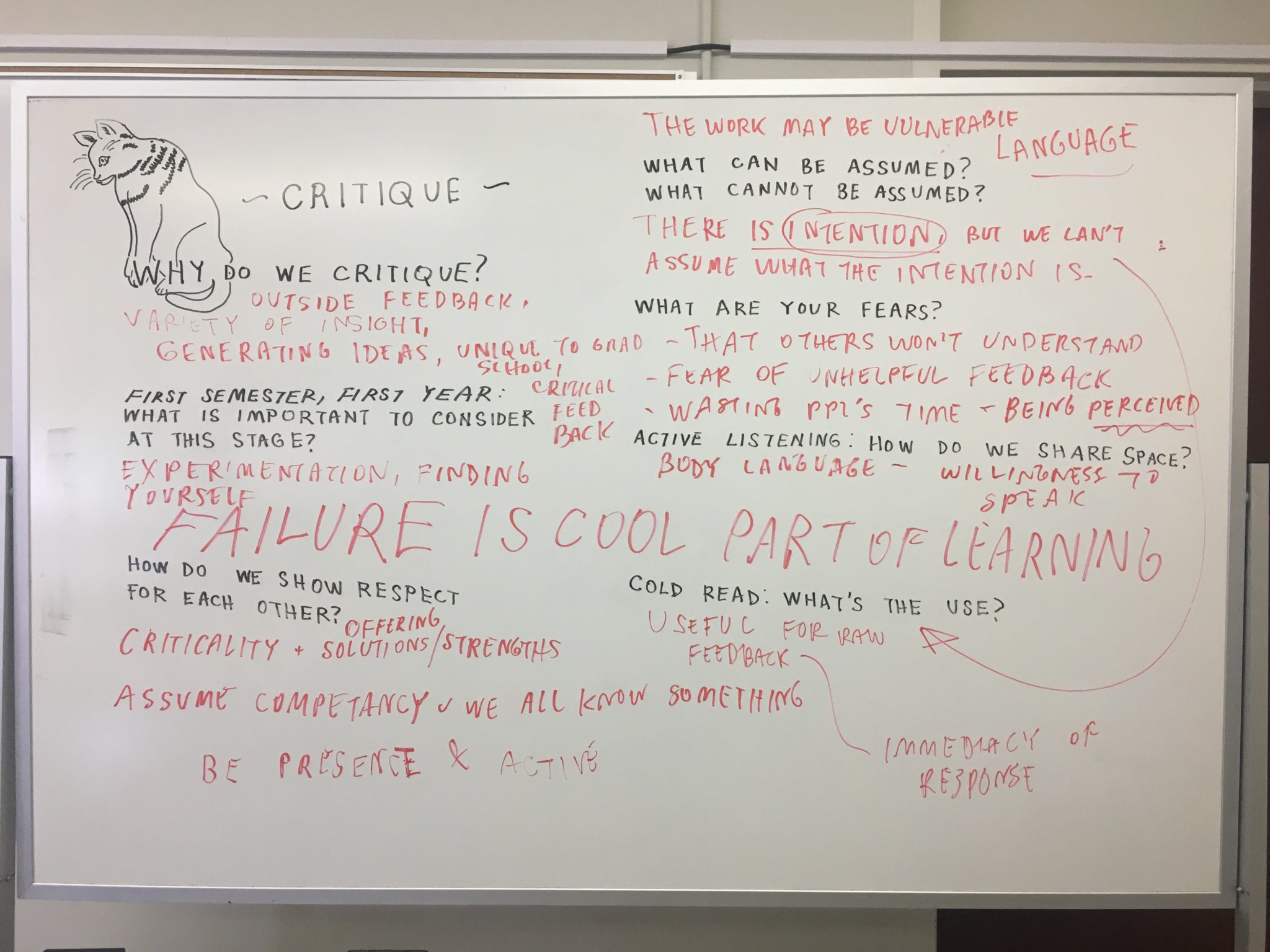
Whiteboard from Isa Gagarin’s section of Graduate Critique Seminar
SEMESTER 2
GRST 7003 Graduate Critique Seminar 2, 3 credits
Same description as 7002 and 7004.
GRLA 7012 Criticism & Theory II, 3 credits
This is the second of two courses that expose students to contemporary visual criticism and theory, along with corresponding historical context. Students gain exposure to artists, designers, systems, curators, critics, and visual/textual methods influencing current practices in art and design, building beyond content/topics covered in the first course. This course brings together reading, discussion, writing, oral presentations, and at least three site-visits (museums, galleries, agencies, conventions, studios, etc.), to help students expand their art and design vocabulary. Students will practice verbally analyzing and articulating their practices in relationship to various histories and cultures. Via individual studio visits with the instructor early in the semester, this course becomes highly tailored to reflect the areas of foci of the enrolled students. With instructor guidance and classmate feedback, students draw connections between their personal practice and course materials, honing the ability to narrate, analyze, and discuss the contexts of their work using new vocabulary. There is particular focus on preparing for the Mid-Program Review’s oral presentation, written statement of intent, and a list of research sources.
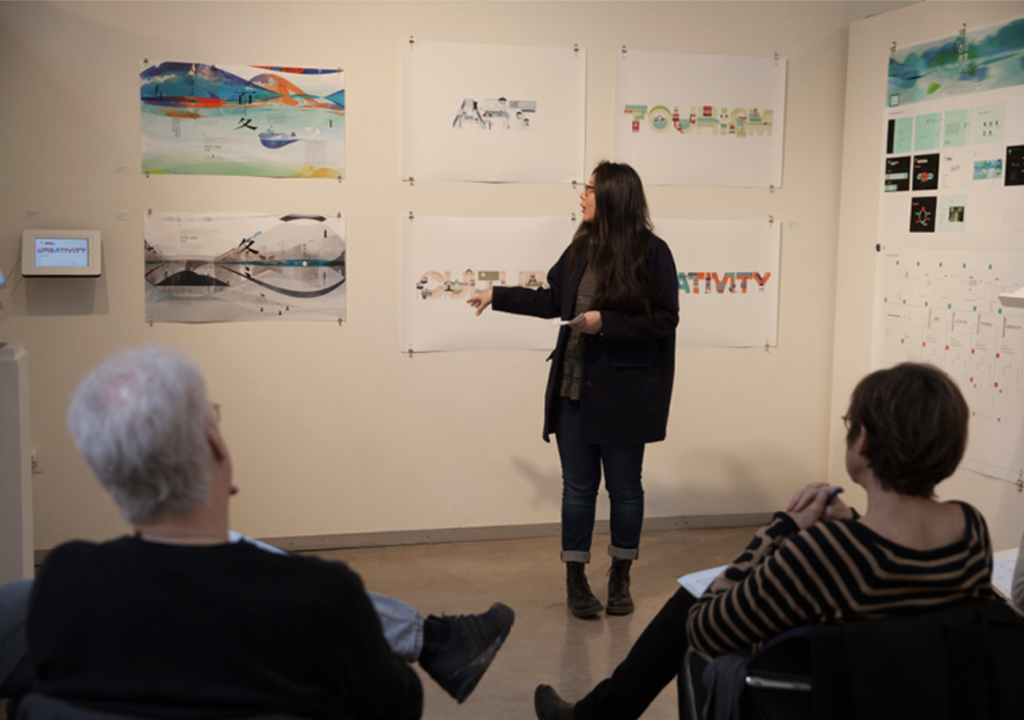
Mid-Program Reviews
At the end of semester two, students present Mid-Program Reviews. The Mid-Program Review demonstrates a student’s progress in the program and their participation in their field of creative production. During the review process, each student installs a sampling of their first-year work, writes a statement of intent, and discusses the work with a committee of faculty and practicing artists. Mid-Program Review is one of the major milestones on the path to developing an MFA thesis project.
SEMESTER 3
GRST 7004 Graduate Critique Seminar 3, 3 credits
Same description as 7002 and 7003.
GRLA 7013 Graduation Preparation 1, 3 credits
This course is designed to help students articulate the theoretical basis of their work in relation to acknowledged contemporary works and culture. Students research, outline, and write the first three-quarters of their thesis paper on the nature of the student’s current practice. The semester concludes with public research presentations based on the student’s work over the course of the semester.
See a selection of past presentations on our YouTube channel.
SEMESTER 4
The final semester culminates in the Thesis Exhibition.
GRLA 7014 Graduation Preparation 2, 2 credits
This course is designed to guide students through the process of final thesis development. Students will meet throughout the semester to ensure work is moving forward according to various requirements and deadlines. There will be a writing intensive component at the end of the semester to complete the required final quarter of the thesis paper. The instructor will submit the final grade for the paper as a part of this course. This course also guides students through the process of finalizing the thesis paper for submission to the college.
GRST 7019 Thesis Exhibition, 1 credit with mentor
This capstone project is the completion of the student’s required studio work for the Thesis Exhibition under the guidance of his or her mentor in preparation for the final thesis review. Graduate candidates navigate this process in consultation with their mentor and the Thesis Committee. The final grade is submitted by the MFA program director upon receiving the signed completion form from the Thesis Committee.
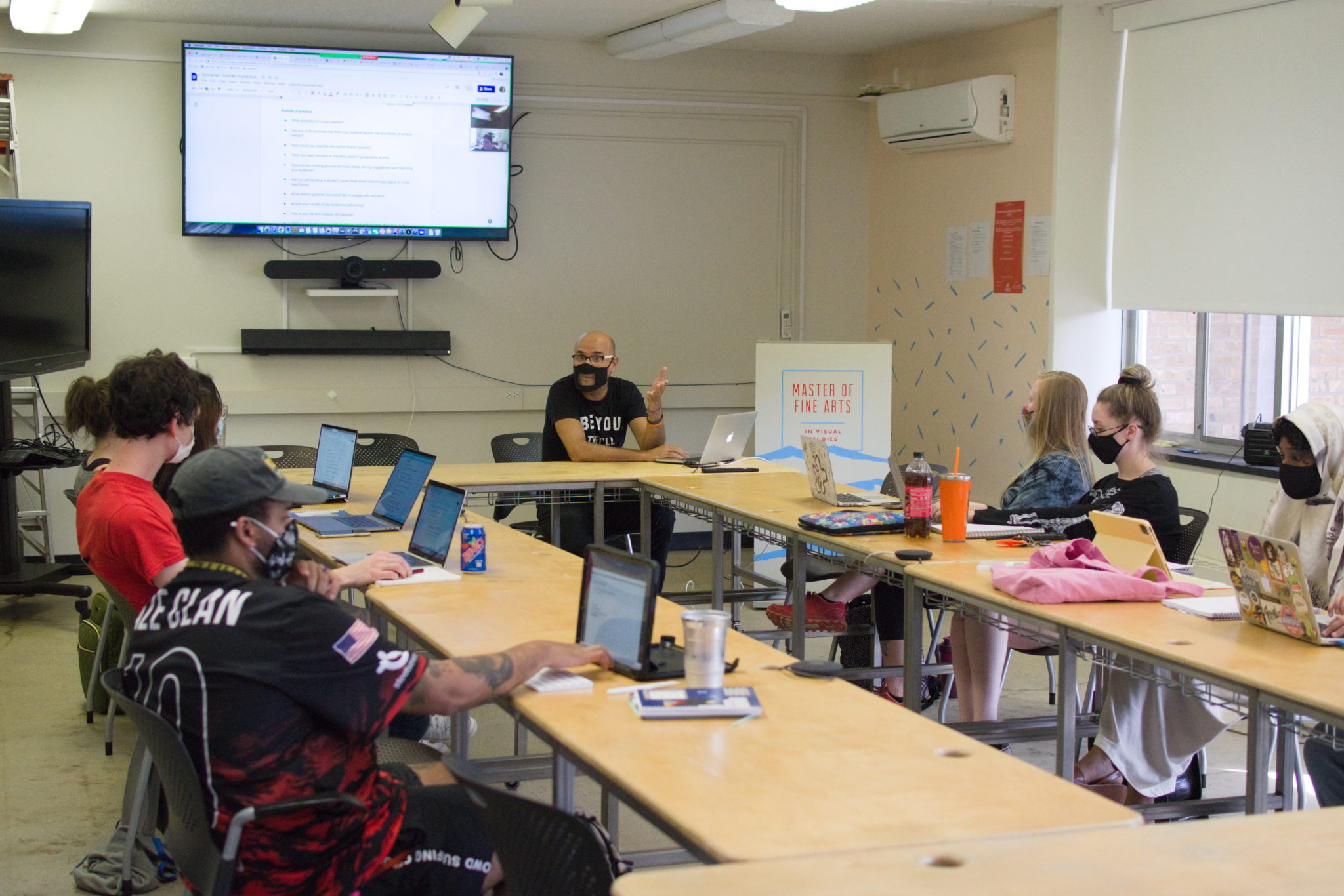
Criticism and Theory 1 with Billy Franklin
ELECTIVES
Students must take 6 credits of electives to graduate. These credits can be taken at anytime during the four semesters. There are several options for these graduate-level electives:
GRLA 7021, Professional Practices, (3 credits)
This course addresses skills and knowledge useful for succeeding post-graduation. Students will further develop their communication skills in both written and oral forms. Via individual studio visits with the instructor early in the semester, this course becomes highly tailored to reflect the areas of foci of the enrolled students that builds upon their prior professional understanding gained through undergraduate study and/or previous professional experience. Topics can include goal setting and planning, informational interviews, job/internship searching/ applications, writing for professional opportunities and applications, the documenting and marketing of work, tax issues, and studio/business startup concerns. By the end of this course the students will be expected to produce a portfolio of documents or artifacts related to their professional goals.
We offer the Teaching Art and Design Online Certificate (3 credits) through MCAD Continuing Education.
- CSLA 6051: Essentials of Online Teaching (1 credit) – This course will introduce you to the essentials of online course design through reading, writing, discussion, and designing a micro-course of your choosing. We will create learning objectives and alignment maps while discussing accessibility, interactivity, universal design for learning, faculty presence, communication tactics, and discussion boards. You will design one week of an online course with a topic of your choosing. This class meets synchronously for five weeks and is the first in a three-part series to complete the Teaching Art and Design Online certificate.
- CSLA 6052: The Creative Process Online (1 credit) – This course will introduce you to strategies to facilitate creativity in an online learning environment. Through readings, writings, and discussions, you will be introduced to concepts that will help you design your own creative course. You will utilize these concepts to create an assignment for an online course of your own design. This class meets synchronously for five weeks and is the second in a three-part series to complete the Teaching Art and Design Online certificate.
- CSLA 6053: Critique Online (1 credit) – In this course, you’ll learn different approaches to leading a successful critique in an online classroom. Through readings, written reflections, and class discussions, you’ll learn about community building, group agreements, giving and receiving feedback, understanding bias, and fostering a growth mindset. At the end of the course, you will design a critique for a class of your own creation. This class meets synchronously for five weeks and is the third in a three-part series to complete the Teaching Art and Design Online certificate.
Through these three 5-week mini-courses, students learn strategies to develop high quality online course design, how to help artists and designers facilitate the creative process remotely, and how to conduct critiques effectively online. Read more about teacher training and support
GRLA 7022, Teaching in Higher Education Seminar, (3 credits)
This course introduces graduate students to general teaching pedagogy, course planning resources, as well as classroom and course management. It exposes students to teaching and learning theories as they develop skills in the higher education classroom. Students in this course will be assigned a teaching assistantship position simultaneous with this course. The cohort will reflect together on their weekly experiences in varied classrooms. The course will also introduce professional documents and strategies for teaching job applications and interviews. Read more about teacher training and support
GRST 7031, Publics & Publication, (1 credit)
This course examines publication holistically through a variety of means, looking at how critical networks of individuals gather around ideas through the social craft of publication. Whether a book, broadside, zine, or a similar production entirely outside the realm of paper-bound craft, publication is primarily an act of public making (and only secondarily or sometimes the production of a commodity). This course explores, from material concerns to distribution, all aspects and stages of production and how people experience and absorb the ideas expressed in a publication. Rooted in the concept that publication can be a non-material tool for relating, the collaborative, investigative approach of this course includes: fashioning publication projects outside the restrictions of technical skills by centering intent over materiality; speaking with practitioners who work in this expanded method of publication; researching historical practices inside and outside of art-making; and using a wider lens of sociocultural production.
Additional Elective Options:
- For-credit internships
- 1-credit electives offered in Spring semesters
- Online courses from the MA in Graphic and Web Design or the MA in Sustainable Design – please ask the MFA Director for access to their current registration guide to determine which classes are being offered in the upcoming semesters, and which courses do not have prerequisites.
- Fall typically features Motion Design, and Systems Thinking, while spring often features Typography, UX, Web Development, and Sustainable Design
- Study abroad options during the summer (optional, added cost)
- Transfer credit from other programs offering graduate study. For example, Ox-Bow offers 2-week graduate courses (3 credits each) over winter break. These transfer credits are generally an extra cost, similar to counting study abroad as an elective (Ox-Bow offers some competitive scholarships).
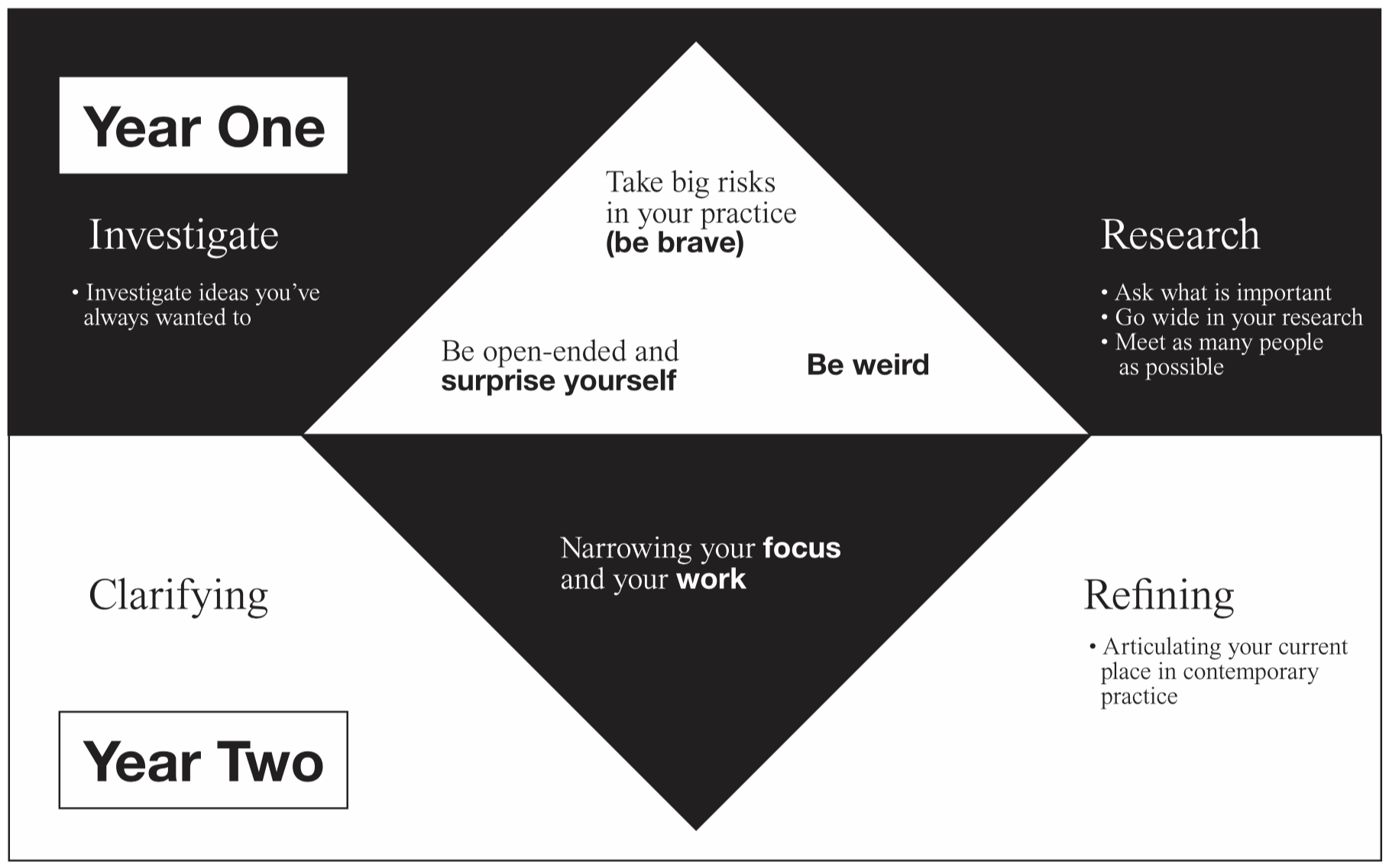
Diamond Planning


